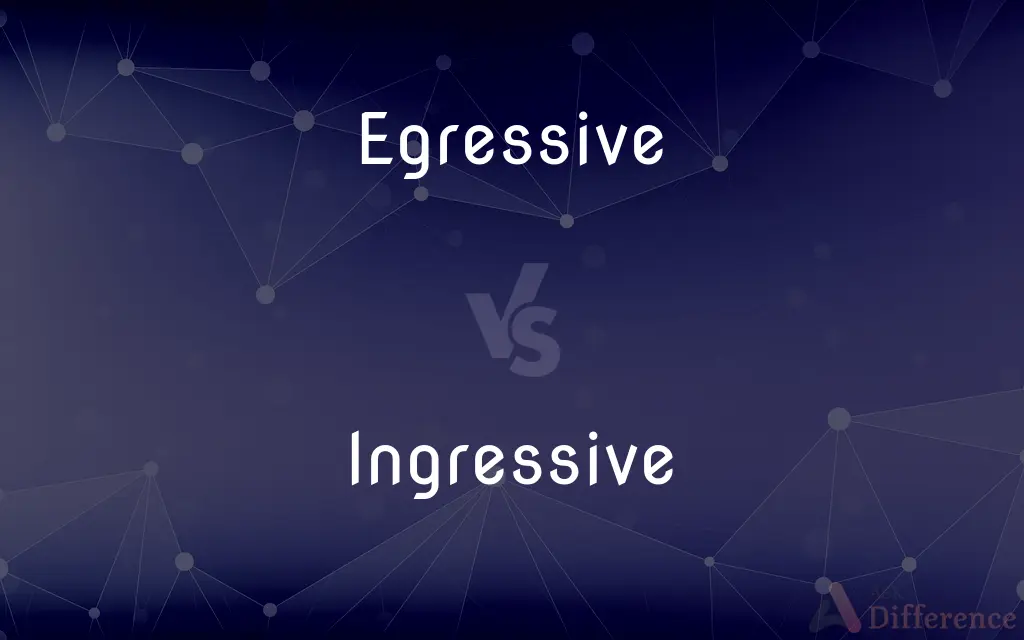Egressive vs. Ingressive — What's the Difference?
Edited by Tayyaba Rehman — By Urooj Arif — Updated on May 13, 2024
Egressive sounds are produced by exhaling air from the lungs, typical of most spoken languages, whereas ingressive sounds involve inhaling air during phonation, common in certain linguistic and cultural contexts.

Difference Between Egressive and Ingressive
Table of Contents
ADVERTISEMENT
Key Differences
Egressive speech sounds, the most common phonation method worldwide, rely on air being pushed out from the lungs. On the other hand, ingressive sounds—less common—are produced by drawing air inward, which affects the tonal quality and volume of the speech.
Phonetically, egressive sounds can be more forceful and are capable of producing a wide range of linguistic tones and volumes. Conversely, ingressive sounds tend to have a softer, more subdued quality due to the nature of inhaling while speaking.
Linguistically, almost all languages use egressive sounds as their primary method of speech production. Ingressive phonation, however, is typically used for specific linguistic functions, such as signaling affirmation or agreement in some Scandinavian languages, or found in cultural expressions like gasps or sighs.
The production of egressive sounds involves typical vocal fold vibration as air passes outward, which facilitates dynamic speech and varied intonation. Ingressive speech, by contrast, often results in a more limited modulation and is sometimes perceived as quieter or less distinct.
Learning to produce ingressive phonations can be challenging for speakers accustomed only to egressive sounds, as it involves coordinating breath and vocalization in a manner opposite to the normative speech patterns.
ADVERTISEMENT
Comparison Chart
Direction of Air
Air exhaled from the lungs
Air inhaled into the lungs
Volume and Force
Generally louder and more forceful
Quieter and softer
Usage in Languages
Predominant in all spoken languages
Limited to specific languages or contexts
Speech Modulation
Allows for dynamic range and intonation
More limited modulation and intonation
Learning Ease
Natural for most speakers
Can be challenging to learn
Compare with Definitions
Egressive
Involving the use of lung air pushed outward to create vocal sounds.
Singing, like speaking, primarily utilizes egressive sound production.
Ingressive
Pertaining to sounds made by inhaling air into the lungs during phonation.
In some cultures, ingressive sounds are used to express agreement silently.
Egressive
Pertaining to sounds made by exhaling air from the lungs.
Most conversations use egressive sounds, where speakers breathe out while talking.
Ingressive
Used specifically in contexts where speech involves a reverse airflow.
Ingressive speech can sometimes be found in ritualistic or cultural chanting.
Egressive
Relating to the outward flow of air during speech.
Pronouncing vowels and consonants in English involves an egressive airflow.
Ingressive
Relating to the inward flow of air during certain linguistic expressions.
Gasps of surprise are often ingressive, involving a sharp intake of air.
Egressive
In phonetics, referring to the typical mode of sound production in spoken languages.
The English language is composed entirely of egressive phonetic sounds.
Ingressive
In phonetics, referring to a less common mode of sound production involving inhalation.
The ingressive pronunciation of 'yes' in Norwegian involves drawing air in.
Egressive
The standard method for vocalization across most linguistic contexts.
Egressive speech is essential for loud and clear communication.
Ingressive
Involving the use of air drawn inward to create vocal sounds.
Learning ingressive phonation can be intriguing for phonetics students.
Egressive
Going or directed outward.
Ingressive
Of, relating to, or involving ingress.
Egressive
Uttered by pushing air out through the mouth or nose.
Ingressive
(Grammar) Inchoative.
Egressive
(geology) descriptive of a place or channel through which something such as water or lava leaves an area.
This ancient wash was an egressive channel that once drained a lake.
Ingressive
(Linguistics) Of or being a speech sound produced with an inhalation of breath.
Egressive
(phonetics) A speech sound in which the air stream is created by pushing air out through the mouth or nose.
Ingressive
Going or directed inward, entering.
Ingressive
Open to entry or examination.
The chances that your Internet activity is being monitored are low, despite the ingressive nature of the modern Internet environment.
Ingressive
Uttered by drawing air inward through the mouth or nose.
Ingressive
(grammar) Aspectually indicating that an action is about to be entered or is in the process of being entered.
Ingressive
(geology) Being a source or channel through which water enters or once entered an area.
This spring is the ingressive source of the water that flows through the cave.
Ingressive
(phonetics) A speech sound in which the air stream is created by drawing air in through the mouth or nose.
Common Curiosities
How do ingressive sounds differ from egressive sounds?
Ingressive sounds are produced by inhaling air, unlike egressive sounds which are made by exhaling.
Are ingressive sounds common in all languages?
No, ingressive sounds are relatively rare and are usually found in specific linguistic or cultural contexts.
What is egressive speech?
Egressive speech involves producing sounds by exhaling air from the lungs, used in nearly all human languages.
Why might someone use ingressive phonation?
Ingressive phonation can be used for emphasis, cultural expressions, or in languages where it forms part of the normal phonetic inventory.
Do any English words use ingressive sounds?
Standard English does not use ingressive sounds; however, non-verbal reactions like gasps do involve ingressives.
What impact does ingressive phonation have on speech clarity?
Ingressive phonation generally results in softer, less clear speech due to the nature of the airflow.
What are the benefits of understanding both egressive and ingressive phonations?
Understanding both can enhance linguistic and phonetic knowledge, particularly for language studies and speech therapy.
Can egressive sounds be loud or soft?
Yes, egressive sounds can vary widely in loudness and intensity, depending on the speaker's control and the language's phonetic structure.
How does one practice ingressive phonation?
Practicing involves consciously inhaling while trying to vocalize, often starting with simple sounds or syllables.
Is it difficult to learn ingressive phonation?
It can be challenging, especially for those who are not accustomed to it as it involves reversing the normal airflow during speech.
Can ingressive sounds carry emotional meaning?
Yes, in some cultures, ingressive sounds can carry specific emotional or communicative meanings, such as agreement or astonishment.
How are ingressive and egressive sounds studied in linguistics?
They are studied in the field of phonetics, which examines the physical properties of sound production in human language.
Are there any health implications of using ingressive sounds frequently?
Typically, there are no health implications, though it might be less efficient for long speeches or communication.
What role does airflow play in phonetics?
Airflow is crucial in phonetics as it directly influences how sounds are produced and heard, impacting everything from volume to clarity.
Share Your Discovery

Previous Comparison
Mustard vs. Sesame
Next Comparison
Update vs. UploadAuthor Spotlight
Written by
Urooj ArifUrooj is a skilled content writer at Ask Difference, known for her exceptional ability to simplify complex topics into engaging and informative content. With a passion for research and a flair for clear, concise writing, she consistently delivers articles that resonate with our diverse audience.
Edited by
Tayyaba RehmanTayyaba Rehman is a distinguished writer, currently serving as a primary contributor to askdifference.com. As a researcher in semantics and etymology, Tayyaba's passion for the complexity of languages and their distinctions has found a perfect home on the platform. Tayyaba delves into the intricacies of language, distinguishing between commonly confused words and phrases, thereby providing clarity for readers worldwide.













































